
|
Border Wars: The conflicts that will define our future
Paperback / softback
Main Details
| Title |
Border Wars: The conflicts that will define our future
|
| Authors and Contributors |
By (author) Professor Klaus Dodds
|
| Physical Properties |
| Format:Paperback / softback | | Pages:304 | | Dimensions(mm): Height 198,Width 126 |
|
| Category/Genre | World history |
|---|
| ISBN/Barcode |
9781529102611
|
| Classifications | Dewey:320.12 |
|---|
| Audience | |
|---|
|
Publishing Details |
| Publisher |
Ebury Publishing
|
| Imprint |
Ebury Press
|
| Publication Date |
24 February 2022 |
| Publication Country |
United Kingdom
|
Description
An thrilling insight into international border geopolitics by one of the UK's leading experts, doing for the future of borders what Prisoners of Geography did for their past. How are borders built in the modern world? What does Brexit mean for Ireland's border? And what would happen if Elon Musk declared himself president of the Moon? In Border Wars, Professor Klaus Dodds takes us on a journey into the geopolitical conflict of tomorrow in an eye-opening tour of the world's best-known, most dangerous and most unexpected border conflicts from the Gaza Strip to the space race. Along the way, we'll discover just what border truly mean in the modern world- how are they built; what do they mean for citizens and governments; how do they help understand our political past and, most importantly, our diplomatic future?
Author Biography
Klaus Dodds is Professor of Geopolitics at Royal Holloway, University of London and a Fellow of the Academy of Social Sciences. He is one of the UK's leading authorities on geopolitics and has written a number of books for a variety of popular and academic audiences including for OUP's A Very Short Introduction series. Since 2006, he has written a monthly geopolitics column for Geographical Magazine; he gives frequent talks on border issues, is an expert in the geopolitics of international terrorism, and is often invited to join panels at events and in the media (including on BBC TV and radio) on the subject of border issues. He is also recipient of the Philip Leverhulme Prize, awarded to 'outstanding researchers whose work has already attracted international recognition and whose future career is exceptionally promising'.
|